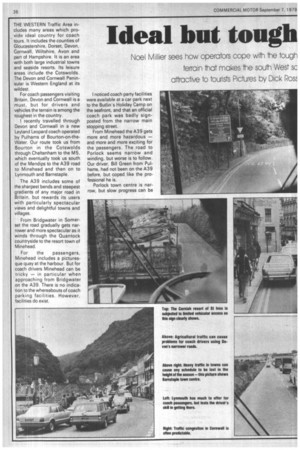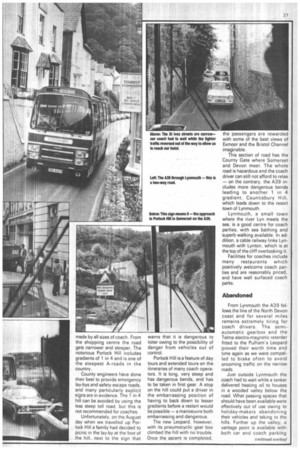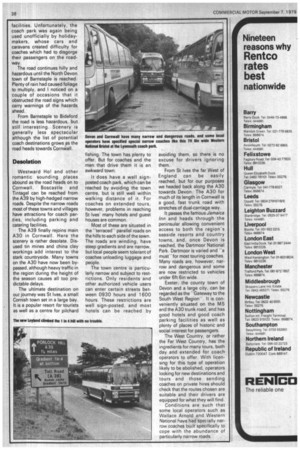Ideal but tough
Page 38

Page 39

Page 40

If you've noticed an error in this article please click here to report it so we can fix it.
\oel Millier sees how operators cope with e tough terrain that makes the sou -n West sc altractiye to tourists Pictures by Dick Ross
THE WESTERN Traffic Area includes many areas which provide ideal country for coach tours. It includes the counties of Gloucestershire, Dorset, Devon,. Cornwall, Wiltshire, Avon and part of Hampshire. It is an area with both large industrial towns and seaside resorts. Its leisure areas include the Cotswolds. The Devon and Cornwall Peninsular is Western England at its wildest.
For coach passengers visiting Britain, Devon and Cornwall is a must, but for drivers and vehicles the terrain is among the toughest in the country.
I recently travelled through Devon and Cornwall in a new Leyland Leopard coach operated by Pulhams of Bourton-on-theWater. Our route took us from Bourton in the Cotswolds through Cheltenham to the M5, which eventually took us south of the Mendips to the A39 road to Minehead and then on to Lynmouth and Barnstaple.
The A39 includes some of the sharpest bends and steepest gradients of any major road in Britain, but rewards its users with particularly spectacular views and delightful towns and villages.
From Bridgwater in Somerset the road gradually gets narrower and more spectacular as it winds through the Quantock countryside to the resort town of Minehead.
For the passengers, Minehead includes a picturesque quay at the harbour. But for coach drivers Minehead can be tricky — in particular when approaching from Bridgwater on the A39. There is no indication to the whereabouts of coach parking facilities, However, facilities do exist. I noticed coach party facilities were available at a car park next to the Butlin's Holiday Camp on the seafront, and that an official coach park was badly signposted from the narrow main stopping street.
From Minehead the A39 gets more and more hazardous — and more and more exciting for the passengers. The road to Porlock seems narrow and winding, but worse is to follow. Our driver, Bill Green from Pulhams, had not been on the A39 before, but coped like the professional he is.
Porlock town centre is narrow, but slow progress can be made by all sizes of coach. From the shopping centre the road gets narrower and steeper. The notorious Porlock Hill includes gradients of 1 in 4 and is one of the steepest A-roads in the country.
County engineers have done their best to provide emergency lay-bys and safety escape roads, and many particularly explicit signs are in evidence. The 1 in 4 hill can be avoided by using the less steep toll road, but this is not recommended for coaches.
Unfortunately, on the August day when we travelled up Porlock Hill a family had decided to picnic in the lay-by at the foot of the hill, next to the sign that warns that it is dangerous to loiter owing to the possibility of danger from vehicles out of control.
Porlock Hill is a feature of day tours and extended tours on the itineraries of many coach operators. It is long, very steep and has dangerous bends, and has to be taken in first gear. A stop on the hill could put a driver in the embarrassing position of having to back down to lesser gradients before a restart would be possible — a manoeuvre both embarrassing and dangerous.
The new Leopard, however, with its pneumocyclic gear box climbed the hill with no trouble. Once the ascent is completed, the passengers are rewarded with some of the best views of Exmoor and the Bristol Channel imaginable.
This section of road has the County Gate where Somerset and Devon meet. The whole road is hazardous and the coach driver can still not afford to relax — on the contrary, the A39 includes more dangerous bends leading to another 1 in 4 gradient, Countisbury Hill, which leads down to the resort town of Lynmouth.
Lynmouth, a small town where the river Lyn meets the sea, is a good centre for coach parties, with sea bathing and superb walking available. In addition, a cable railway links Lynmouth with Lynton, which is at the top of the cliff overlooking it.
Facilities for coaches include many restaurants which positively welcome coach parties and are reasonably priced, and have well surfaced coach parks.
Abandoned From Lynmouth the A39 follows the line of the North Devon coast and for several miles remains extremely tiring for coach drivers. The semiautomatic gearbox and the Telma electro-magnetic retarder fitted to the Pulham's Leopard .proved their worth time and time again as we were compelled to brake often to avoid oncoming traffic on the narrow roads.
Just outside Lynmouth the coach had to wait while a tanker delivered heating oil to houses in a wooded valley below the road. What passing spaces that should have been available were effectively out of use owing to holiday-makers abandoning their vehicles and taking to the hills. Further up the valley, a vantage point is available with both car and coach parking facilities. Unfortunately, the coach park was again being used unofficially by holidaymakers, whose cars and caravans created difficulty for coaches which had to disgorge their passengers on the roadway.
The road continues hilly and hazardous until the North Devon town of Barnstaple is reached. Plenty of rain had caused foliage to multiply, and I noticed on a couple of occasions that it obstructed the road signs which carry warnings of the hazards ahead.
From Barnstaple to Bideford the road is less hazardous, but still interesting. Scenery is generally less spectacular although the list of potential coach destinations grows as the road heads towards Cornwall.
Desolation
Westward Ho! and other romantic sounding places abound as the road heads on to Cornwall. Boscastle and Tintagel can be reached from the A39 by high-hedged narrow roads. Despite the narrow roads most of these towns and villages have attractions for coach parities, including parking and catering facilities.
The A39 finally rejoins main A30 in Cornwall. Here the scenery is rather desolate. Disused tin mines and china clay workings add interest to the stark countryside. Many towns on the A30 have now been bypassed, although heavy traffic in the region during the height of the season causes all too predictable delays.
The ultimate destination on our journey was St Ives, a small Cornish town set in a large bay. It is a popular resort for tourists as well as a centre for pilchard
fishing. The town has plenty to offer. But for coaches and the men that drive them it is an awkward town.
It does have a well signposted coach park, which can be reached by avoiding the town centre, but is still well within walking distance of it. For coaches on extended tours, however, problems in reaching St Ives' many hotels and guest houses are common.
Most of these are situated in the -terracedparallel roads on the hills to each side of the town. The roads are winding, have steep gradients and are narrow, but local people seem tolerant of coaches unloading luggage and people.
The town centre is particularly narrow and subject to restrictions. Only residents and other authorized vehicle users can enter certain streets between 0930 hours and 1600 hours. These restrictions are well sign-posted, and most hotels can be reached by avoiding them, so there is no excuse for drivers ignoring them.
From St Ives the far West of England can be easily reached, but for our purposes we headed back along the A30 towards Devon. The A30 for much of its length in Cornwall is a good, fast trunk road with stretches of dual-carriage way.
It passes the famous Jamaica Inn and heads through the peninsular allowing convenient access to both the region's seaside resorts and country towns, and, once Devon is reached, the Dartmoor National Park. Dartmoor is varied and -a must'' for most touring coaches. Many roads are, however, narrow and dangerous and some are now restricted to vehicles under 6ft 6in wide.
Exeter, the county town of Devon and a large city, can be regarded as the 'Gateway to the South West Region-. It is conveniently situated on the M5 and the A30 trunk road, and has good hotels and good coach parking facilities as well as plenty of places of historic and social interest for passengers.
The West Country, or rather the Far West Country, has the ingredients for many tours, both day and extended for coach operators to offer. With licensing for this type of operation likely to be abolished, operators looking for new destinations and tours and those sending coaches on private hires should check that the routes chosen are suitable and their drivers are equipped for what they will find.
Conditions are such that some local operators such as Wallace Arnold and Western National have had specially narrow coaches built specifically to cope with the abundance of particularly narrow roads.












































































































































